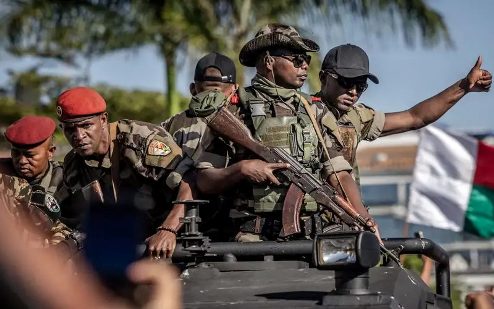
LAGOS SEPTEMBER 2ND (NEWSRANGERS)-President Muhammadu Buhari stunned participants at the opening ceremony of the 2018 Annual General Conference of the Nigeria Bar Association (NBA) last Sunday in Abuja when he said the rule of law must be subject to the supremacy of the nation’s security and national interest.
Buhari, at the conference, declared that where national interest was threatened, the security of the country could not be sacrificed on the altar of the rule of law.
“Our apex court has had cause to adopt a position on this issue in this regard and it is now a matter of judicial recognition that where national security and public interest are threatened or there is a likelihood of their being threatened, the individual rights of those allegedly responsible must take second place, in favour of the greater good of the society,” the president said.
But the declaration has continued to attract a lot of criticisms, with some people wondering if the nation is not gradually descending to the dark days of military despotism.
Many believe that Buhari may be justifying the detention of some persons since his administration came on board and, at the same time, watering the ground for a full blown dictatorship.
Sambo Dasuki, former National Security Adviser, and Sheikh Ibrahim El-Zakzaky, the leader of the Shiite Islamic group, have been in detention for more than two years. Dasuki was arrested and detained since 2015 over alleged diversion of $2.1b meant for the procurement of arms to fight Boko Haram and illegal possession of firearms.
The former security adviser has so far secured six court orders that he should be released on bail pending the determination of the charges against him.
But the Buhari government has failed to obey all the court orders, claiming that Dasuki’s release would be a threat to national security.
The government has also failed to obey all court orders granting El-Zakzaky and his wife, Zeenat, bail. They were charged for culpable homicide.
For instance, Justice Gabriel Kolawole of the Abuja Division of the Federal High Court ordered El-Zakzaky’s release and berated the federal government for violating his rights. The judge also ordered the government to pay a fine of N50 million to the couple and provide accommodation for them and other members of their family.
Instead of obeying the court order, the federal government filed an appeal against the ruling, about two weeks after the expiration of the deadline for El-Zakzaky’s release.
Contrary to the violation of court orders by his government, Buhari has on some occasions pledged commitment to the rule of law. Reacting to cases of human rights abuses by security operatives few months after he became president, Buhari vowed that his government would not allow a situation where the rule of law would be undermined.
He said: “Let me reiterate this administration’s commitment to due process, merit and total observance of the rule of law as central pillars of a prosperous and democratic society.”
Also, the president had on July 17, this year, at the 20th anniversary of the International Criminal Court, expressed a strong belief in respect for the rule of law and human rights.
But the Nigerian Bar Association (NBA ) has faulted argument by President Buhari that National interest/security takes priority over rule of law.
NBA President, Abubakar Mahmoud (SAN), in a communiqué said rule of law is supreme in every democracy. The association also frowned at the practice “where the Executive selects which court order to obey.”, while calling for a non-selective fight against corruption by the Federal Government.
Femi Falana, Senior Advocate of Nigeria (SAN), said the president had reopened the debate over the clash between the two concepts.
Falana disagreed with Buhari, stating that national security was subject to the rule of law. Falana argued that the purpose of national security should be to protect democracy and enhance democratic principles, lamenting that majority of political office holders in the country were not committed to the observance of the rule of law.
According to him, the political system had enthroned the rule of might or rule of rulers in place of the rule of law.
“I want to believe that the President is not unaware that respect for human rights is the fundamental basis of a democratic society that is genuinely committed to the consistent implementation of the rule of law. Human rights are indeed the basic building blocks that governments must cultivate in order to have an effective relationship with the general population.
“The extent that the protection of these rights is guaranteed signifies the democratic strength of a country. Indeed, human rights and the rule of law are crucial to the well being of any truly democratic society. These rights include not only civil and political rights but also economic, social and cultural rights. They are articulated and entrenched in national constitutions and the Charter of the United Nations, the Universal Declaration of Human Rights and other human rights treaties to which Nigeria has subscribed.
“Human rights, the rule of law and democracy are interlinked and mutually reinforcing: they are part of the universal values and principles espoused by the international community. Nevertheless, it must be noted that since the birth of the human rights movement in the mid-twentieth century, the promotion of human rights and the rule of law has been seen as competing with or even compromising core issues of national security.
“Promoting human rights is now frequently viewed as a luxury, to be pursued when the government has spare diplomatic capacity and national security is not being jeopardized. In Nigeria, there is a continuing tension between national security and respect for human rights.
“While human rights and the rule of law are concerned with limitations on state power, national security, by contrast, is intertwined with assertion of state power. The result of this has often been the marginalization of human rights in the name of national security by successive governments.
“The subordination of human rights to national security has been a permanent feature of Nigeria’s political history. More than anything else, high level official corruption (and associated human rights violations) poses a major threat to national security, human security and individual human rights in Nigeria,” Falana said.
Remigius Akinbinu, also a legal practitioner, said the whole concept of the rule of law was so clearly defined that it was baffling to discover that Buhari could attempt to give it an entirely different meaning and import.
“With that assertion by the Presidency that national interest and national security can override the rule of law coupled with its recent actions or inaction in defiance of court orders, it is obvious that we have a Presidency that sees despotism, dictatorship and totalitarianism as the best way to rule because those are the vices disobedience of the Rule of Law will lead to.
“The point is it is only the Court that can determine what constitutes a threat to national security and what doesn’t. No other entity can refuse to accept the court’s decision. The Presidency has disobeyed the orders of court by not releasing Messrs Dasuki and El Zakzaki even after they were granted bail claiming they are threats to national security.
“This is wrong because the court already considered national security before granting bail. The Presidency or any other entity or arm of government cannot on its own determine what constitutes national interest or security and uses that to infringe on the rights of citizens. That will be contrary to the most important aspect of the Rule of Law, that is, the Supremacy of the Law,” he said.
Kayode Ajulo, an Abuja-based lawyer, noted that the framers of the country’s constitution had national interest in mind while drafting it. Ajulo viewed the statement of President Buhari as a violation of the nation’s constitution.
Ajulo said: “The ultimate national interest is codified in the Constitution. Fundamental human rights are hinged on the rule of law and if the rule of law is now to play second fiddle, then there is a potential to trample on these rights protected by our constitution.
“The President’s statement is ultra vires our constitution and every tenet of his claim as the President of our federation and, therefore, the statement has no legs to stand on. No serious citizen would take him seriously on it.” Similarly speaking on the issue, another lawyer, Ebun-Olu Adegboruwa, said positing that national security should override the rule of law had portrayed Buhari as harbouring dictatorial intentions, wondering why the president should prefer national security as a priority for governance.
Adegboruwa said: “It is a dangerous proposition as we approach 2019. Taken to its proper interpretation, it may be taken to be an advance notice to the people of Nigeria to brace up for likely threats to their rights and liberties in the coming days.
“Whereas we all support the President in the fight against corruption and terrorism, it is still necessary to allow the rule of law to have the pride of place in all spheres of governance. It was under national security for instance that I was kept in custody from November 2007 till July 2008, without trial at all.”
Sunday Independent
Buhari’s Comment On National Interest Raises Fears Of Dictatorship









